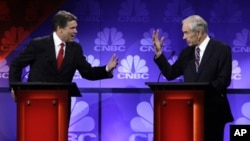As the United States struggles to revive its lagging economy and looks at security challenges abroad, China is increasingly being named as a key concern. And with the U.S. presidential elections less than a year away, Beijing is getting plenty of mention - be it in the Republican primary, Congress or from the president himself.
The sharpest attacks have come during the Republican primary race, on the campaign trail and in debates such as one this week that focused on U.S. foreign policy.
Texas Governor Rick Perry named China as the biggest national security issue for the United States during that debate.
"When you have 35,000 forced abortions a day in that country," said Perry. "When you have the cyber security that the PLA [China's army - People's Liberation Army] has been involved with, those are great and major issues both morally and security wise that we've got to deal with now."
Former Massuchusetts Governor Mitt Romney agrees that China is a long term security issue. Here are some comments Romney made recently on the campaign trail.
"In the agreements we have with them on trade they don't follow them and one of the most reprehensible practices on the part of Chinese enterprises - many of which are of course owned by the government - is stealing the designs, patents and technology of American and other companies," said Romney. "And stealing it, re-selling it, and making money off of what we've created."
Cheng Li, a China analyst at The Brookings Institution here in Washington says that with economics dominating the U.S. elections, polticians are looking for someone to blame.
"Nowadays, when we talk about economics, talk about the global economy, talk about the U.S. economy, we cannot do so without talking about China's rise and China's growing economic competitiveness," said Cheng Li.
He adds that for the first time in this election, the Republican candidates all have chosen China as a major target.
"Usually the Republicans can be considered as more pro-China because of the tremendous economic interests and to colloborate with China," he said. "But the whole game has changed."
However, Republican presidential hopefuls are not the only ones with tough words for China. At the recent APEC Leaders Summit in Hawaii, President Barack Obama took China to task over its trade practices.
"Their role is different now than it was 20 years ago, or 30 years ago, where if they were breaking some rules, it did not really matter," said President Obama. "It did not have a significant impact, you were not seeing huge trade imbalances that had consequences for the world financial system. Now, they have grown up and so they are going to have to help mange this process in a responsible way."
Beijing is frequently accused of cheating at trade and of supporting or not doing enough to stop unfair trade practices. Those calls are getting more intense and focused and it appears that resonates with voters.
According to a CBS News Poll released last month, 61 percent of Americans consider China's economic expansion as generally bad.
Recently, the U.S. Ambassador to the World Trade Organization sent a letter to his Chinese counterpart about China's strict control of the Internet.
The letter asked China to explain why it blocks Internet web sites and raised concerns that such practices were limiting companies access to consumers in China.
At a hearing last week, U.S. Senator Sherrod Brown, a Democrat from Ohio, argued that China's Internet policies were not only undermining human rights, but unfair to American trade interests as well.
"This policy benefits Chinese domestic companies at the expense of companies like Facebook, Twitter, and You Tube who are completely blocked in China. Companies whose business models rely on openness and transparency - are forced to be an arm of the Chinese government or turn their backs on 1.3 billion customers," said Brown.
In October, the U.S. Senate passed a bill - with support from both Democrats and Republicans - that seeks to punish China for manipulating the value of its currency, the yuan. Economists and politicians argue that China keeps the value of its currency artificially low to keep its exports cheap. This in turn, they argue, leads to a loss of American jobs.
China denies it keeps its currency artifically low and notes it is working maintain a floating exchange rate at its own pace.
Chinese state media say U.S. politicians are using China as a scapegoat for their own problems.
And while Cheng Li says there is concern growing anti-American sentiment in China could get out of control, the country's leaders are keeping themselves out of the debate.
"[The] Chinese leadership has been careful not to overstate the tensions or problems because this will make them more difficult in the future if they want to improve the relationship," said Cheng Li.
Heightening those tensions, Li adds, is something China would want to avoid ahead of a major visit by Chinese Vice President Xi Jinping to the United States in January. Xi is expected to succeed current President Hu Jintao in 2012, around the time that the U.S. elections take place.




